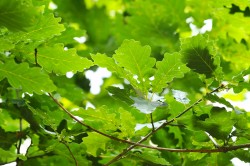Press Release, 11. April 2023
Climate adaptation of forest trees: launch of the DFG research unit "PhytOakmeter"
The damaging effects of climate change on European forests has been clearly visible since the drought of 2018. It is unclear how the native forests can adapt in the face of such drastic and rapid environmental changes. The international and interdisciplinary research unit "PhytOakmeter", which includes scientists from the UFZ and is funded by the German Research Foundation (DFG) with around € 8 million, plans to investigate this question over the next eight years. The focus is on the common oak as a model tree.
The project name "PhytOakmeter" is the programme of the cooperation. The aim is to understand the oak and its microbiome so well with respect to their reaction to environmental changes that they can be regarded as a plant sensor (phytometer) for climate stress in the forest. The researchers fortunately have a 40-year-old clone of the common oak (Quercus robur L.) at their disposal. It can be easily propagated and grown on a nutrient medium. In this context, clone means that the oaks are genetically identical and that even small cuttings have some of the characteristics of mature trees. The researchers can thus find out how strongly the microbiome can contribute to stress adaptation.
In their experiments, the research unit examines the oak saplings established at the Helmholtz Centre for Environmental Research (UFZ), the German Centre for Integrative Biodiversity Research (iDiv), and the University of Marburg. Artificially created miniature ecosystems, Ecotrons, makes it possible to systematically vary environmental parameters such as temperature and moisture, and track the responses of the oaks. In nature, the clone is further studied in the research forests of the universities of Marburg and Basel, as well as at 12 sites between south-western France and southern Finland. In all research platforms, the experts are looking at the interactions of the root system with specialised fungi and root nematodes. Others are examining insect pests high up in the treetops. Based on their results, the researchers want to deduce how, in future tree plantings, the oak and its microbiome can be ideally prepared for the soil and expected environmental changes. "In the data, we are looking for patterns that give insight into the mechanisms that oaks use to adapt to climate change", says plant ecologist Prof. Lars Opgenoorth, who coordinates the overall project at the University of Marburg.
The project partners from the UFZ have been working with the common oak as a model tree in several projects for almost 20 years. Since the 1990s, scientists have been studying the oak clone DF159, which is also the backbone of the new DFG-funded research group "PhytOakmeter". They have been looking at how oaks regulate their own development as well as the numerous interactions with beneficial and harmful micro-organisms and animals.
The UFZ thus offers the best conditions for intensive participation in "PhytOakmeter". The UFZ Departments of Soil Ecology and Environmental Microbiology are involved in four sub-projects in which the scientists are investigating the following topics, among others:
- Research into the gene regulation of oak and associated bacterial communities
- Research into ectomycorrhizal symbiosis, which is fundamental for nutrient acquisition and stress resistance in oaks
- Research into fungi and bacteria that form an interface between the oaks and the soil surrounding them
- Monitoring of DF159 seedlings, which the UFZ has already planted out at 12 locations in Europe and central Germany
- Coordination of a central experiment on drought and herbivore infestation at iDiv/UFZ Ecotron
- Research into nematodes, which stimulate nutrient cycling in the soil but can also parasitize roots
"Only by jointly assessing the changes in diversity and functional properties of these oak-associated communities and oak physiology can we evaluate their importance for oak stress tolerance", says Mika Tarkka.
"PhytOakmeter" is one of 13 Research groups newly established by the German Research Foundation (DFG). "PhytOakmeter" will be funded with around € 7 million over the next four years as part of the D-A-CH cooperation together with the Swiss National Science Foundation (SNSF). If the work is successful, a second research phase of a further four years is planned. In addition to the University of Marburg (coordination), the universities of Freiburg and Leipzig, the Helmholtz Centre for Environmental Research (UFZ), the Swiss Federal Institute for Forest, Snow and Landscape Research (WSL), and the German Centre for Integrative Biodiversity Research (iDiv) are involved in the project.
Further information
Prof. Dr. Lars Opgenoorth
Philipps University, Marburg
lars.opgenoorth@biologie.uni-marburg.de
Prof. Dr. Mika Tarkka
Head of the UFZ Department of Soil Ecology
mikka.tarkka@ufz.de
UFZ press office
Susanne Hufe
Phone: +49 341 6025-1630
presse@ufz.de
In the Helmholtz Centre for Environmental Research (UFZ), scientists conduct research into the causes and consequences of far-reaching environmental changes. Their areas of study cover water resources, ecosystems of the future, environmental technologies and biotechnologies, the effects of chemicals in the environment, modelling and social-scientific issues. The UFZ employs more than 1,100 staff at its sites in Leipzig, Halle and Magdeburg. It is funded by the Federal Government, Saxony and Saxony-Anhalt.
www.ufz.deThe Helmholtz Association contributes to solving major challenges facing society, science and the economy with top scientific achievements in six research fields: Energy; Earth and Environment; Health; Key Technologies; Matter; and Aeronautics, Space and Transport. With some 39,000 employees in 19 research centres, the Helmholtz Association is Germany’s largest scientific organisation.
www.helmholtz.de
